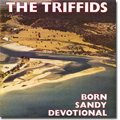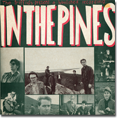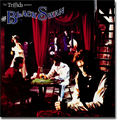- Disc One
- Bury Me Deep In Love
- Kelly's Blues
- A Trick Of The Light
- Hometown Farewell Kiss
- Unmade Love
- Open For You
- Holy Water
- Blinder By The Hour
- Vagabond Holes
- Jerdacuttup Man
- Calenture
- Save What You Can
- Baby Can I Walk You Home
- Region Unknown
- Love The Fever
- Bad News Always Reminds Me Of You
- Everything You Touch Turns To Time
- Disc Two
- Bury Me Deep In Love
- Kelly's Blues
- A Trick Of The Light
- Hometown Farewell Kiss
- There Must Be A Curse On Me
- Open For You
- Burned
- Blinder By The Hour
- Vagabond Holes
- Jerdacuttup Man
- Save What You Can
- Calentura
A Personal View:
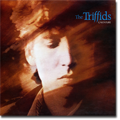 Calenture is a record that caused The Triffids to be accused of selling out.
Calenture is a record that caused The Triffids to be accused of selling out.
It was our first record for a major label. We'd signed to Island Records in early November 1986. This opened up many possibilities for us. Until then we'd largely financed our records by ourselves - suddenly we were being actively encouraged to spend money. I caught the train out to Gerry Hogan's pedal steel shop in Newbury with an Island Records cheque complete with cute little palm tree and got myself a single neck ten string MCI pedal steel in a muted grey finish (wished I'd got the red later) and a Peavey Vegas amp. We had discussions about producers, we made lists of instruments to hire, studios we'd like to use. Actually the signing brought us a new batch of problems, not only related to the expectations of Island but those of ourselves as well.
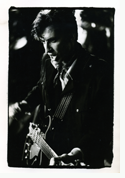 After a truly strange and unsettling period trying to record some songs under the production of Craig Leon, we found ourselves back working with Gil Norton, producer of Born Sandy Devotional. It was always our intention to make Calenture a big production album and I think Island expected something more polished than any of the bands earlier releases so there were no clashes on that score. There were certainly disagreements about how to achieve that end however. We ended up recording in seven different studios over a period of several months spending a frightening amount of money, even by the standards of the time. But the result, though it sounds more "of its time" than any other Triffids record, is still a powerful and beautifully balanced album that showed what a fine singer of his own superlative songs David McComb was.
After a truly strange and unsettling period trying to record some songs under the production of Craig Leon, we found ourselves back working with Gil Norton, producer of Born Sandy Devotional. It was always our intention to make Calenture a big production album and I think Island expected something more polished than any of the bands earlier releases so there were no clashes on that score. There were certainly disagreements about how to achieve that end however. We ended up recording in seven different studios over a period of several months spending a frightening amount of money, even by the standards of the time. But the result, though it sounds more "of its time" than any other Triffids record, is still a powerful and beautifully balanced album that showed what a fine singer of his own superlative songs David McComb was.
It was Dave's philosophy that a recording studio was an environment in which you were supposed to do the extraordinary thing - you weren't meant to sound like everybody else and you didn't have to to be careful you didn't record anything you'd have trouble playing live. I have some memories of both silly and noteworthy extremes being taken. We hired a white SG guitar with a whammy bar (the colour was as important as the whammy bar) but no one touched it for two weeks so we sent it back. While doing backing vocals for the outro of Vagabond Holes we ran the microphone through every effects pedal we could find to try to get a wonderful and extreme sound but it ended up sounding fairly plain when properly sat in the mix. Dave wanted some folky sounding instruments for Jerdacuttup Man - I think he wanted a harmonium but through a happy circumstance of miscommunication he got Keith Hancock on a kind of large piano accordian (a melodian) and Mick Doonan on the uilleann pipes. A great mistake if there ever was one. I'd still like to know why, when guitar riffs and chords were being sampled left right and centre in a mad frenzy for the then new technology, I had to play the whole repeating cascading riff of A Trick Of The Light from start to finish, employing someone elses finger for one of the particularly tricky bits. While its beginnings may have been a disaster of epic proportions the process of recording the album is one I have fond memories of. We really did have high hopes that we'd achieve mainstream success. I can remember listening to a final mix of A Trick Of The Light on headphones and being convinced it was a hit single. I'm still waiting for this to happen.
The reissued Calenture has been remastered to bring out the very best that modern technology is capable of and I think it does definitely sound fuller and sweeter with more detail evident on certain sections. The fact is that it sounded pretty good to begin with as it was recorded and mixed meticulously in the first place, and we went to no extremes with the remaster for fear of upsetting that balance. We've included all B sides from the period (excepting our version of the Beatles' Good Morning, Good Morning) and a whole extra disc of demos and unreleased tracks assembled to make up a mythical Calenture from some parallel universe. Perhaps Trick was a hit over there.
Graham Lee - 2007


